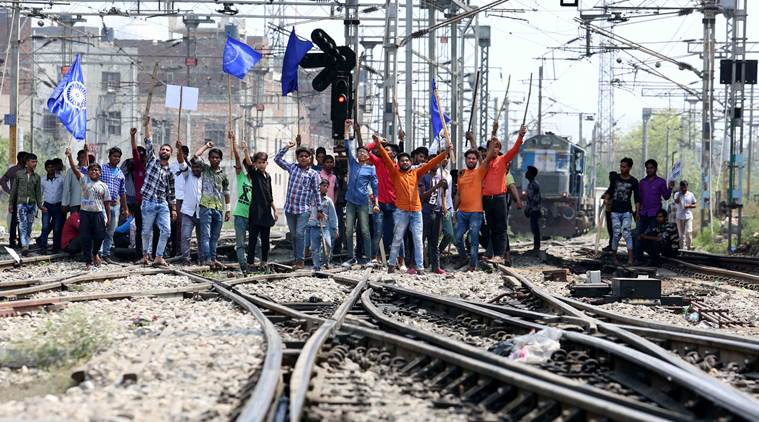Making clear “we are not going by any agitation”, the Supreme Court Tuesday declined an interim stay on its March 20 order which forbids arrest without prior permission for an offence under the Scheduled Castes and Scheduled Tribes (Prevention of Atrocities) Act.
The judges said the Centre’s review petition, filed Monday when Dalits staged protests across the country against what they called dilution of the Act, will again be heard after written submissions are filed. The hearing Tuesday was in open court, as desired by the Centre.

“We are not diluting any provisions of the Act, we are only protecting the innocent… only reiterating the law of arrest,” a bench of Justices A K Goel and U U Lalit said, turning down Attorney General K K Venugopal’s plea to keep in abeyance the March 20 directions — for a preliminary enquiry before registration of a case and sanction for the arrest of the accused — till the matter is finally decided.
Venugopal told the bench that he was not bringing up its direction on the provision of anticipatory bail to an accused under the Act but was raising its directions for a preliminary enquiry and prior sanction for arrest.
READ: Curfew in Rajasthan’s Hindaun City after houses of Dalit MLA, former minister set on fire; over 40 arrested
The judges clarified that authorities will not have to wait for registration of an FIR to grant compensation to victims of offences under the Act. And in case it involves an offence under the Act and IPC like rape, murder etc, an FIR can be filed straightaway.
Referring to the Bharat Bandh protests Monday, the bench said “people who are agitating may not have even read the order. They may have been misled by vested interests”. It said “we are not going by any agitation” and asked the parties to confine their arguments to the March 20 ruling.
Story continues below this ad
“Our action is only to protect constitutional rights. We are conscious that the underprivileged have to be given all rights. Only that innocents should not be falsely implicated.”
The March 20 judgment noted instances of abuse of the 1989 Act and laid down stringent safeguards, including provisions for anticipatory bail and a “preliminary enquiry” by a DSP before registration of a case under the Act. The court said an accused public servant can only be arrested with the permission of the appointing authority and, if it concerns a person who is not a public servant, permission has to be obtained from the district SSP.
Venugopal told the bench Tuesday that the directions were unnecessary. He contended that the Act was a special law made for people who had been deprived and discriminated against over centuries. The direction for a preliminary enquiry, he said, was discriminatory since there was no such condition for prior verification before registration of a case under any other law.
“The Code of Criminal Procedure stands amended by this and a larger regime has been imposed,” the Attorney General said, referring to the court’s directions.
Story continues below this ad
The bench said it had highlighted the police abuse of the power to arrest. “In so many cases, this court has laid down that arrest is unnecessary… It is not the law that the moment an FIR is registered, a person must be arrested,” the judges said.
On the direction that sanction should be taken from the appointing authority to arrest a public servant, Venugopal said “this is the legislature’s duty”.
When the bench said “we are only protecting the innocent”, Venugopal countered: “Who is to decide whether a person is innocent or not at the stage of filing of FIR? That is to be decided after trial.”
At this, the bench said: “If there is no forum (to scrutinise), there should be one.”
Story continues below this ad
The AG did not relent: “What is said for SC/ST Act (about need for prior sanction) applies to every case, of almost every Act… Only members of SC/ST will be subject to this special regime, others under identical circumstances will not be.”
Referring to the Act, he said there is provision for grant of compensation to victims but now this may be delayed because the court has not set any outer limit for completion of preliminary enquiry.
The bench said the March 20 order had laid down that such a preliminary enquiry should be completed within seven days. “So the outer limit is fixed,” Justice Goel said, adding “it can even be completed in one hour, if needed”.
“There should not be terror in society… We do not want to deny anyone their rights. We do not want complainants to lose their rights. It is only to protect the innocent,” he said.
Story continues below this ad
Venugopal wanted to know what if “someone calls a member of the SC/ST names in a public place”. Justice Goel said “it can be verified”. At this, the AG said “why should it be when there is no such verification in other cases”.
The bench told him that “it’s because in those cases, there is provision for anticipatory bail, unlike here where the person is straightaway put behind bars”. Venugopal then said “I am leaving anticipatory bail… there is no need to verify at all”.
But the bench said: “We have not said don’t implement the Act… Our apprehension is that no innocent’s constitutional liberty should be taken away.”

 Dalit Activists protesting on the Railway tracks in Ludhiana on Monday during countrywide Bharat Bandh against the recent judgment by the Supreme Court on the SC & ST (Prevention) Atrocity Act 1989. (EXPRESS PHOTO BY Gurmeet Singh)
Dalit Activists protesting on the Railway tracks in Ludhiana on Monday during countrywide Bharat Bandh against the recent judgment by the Supreme Court on the SC & ST (Prevention) Atrocity Act 1989. (EXPRESS PHOTO BY Gurmeet Singh)






